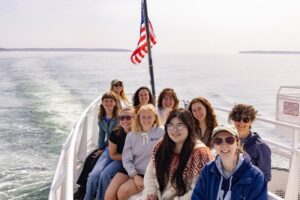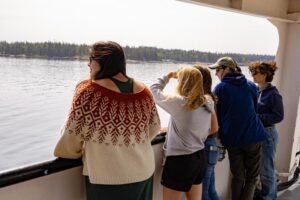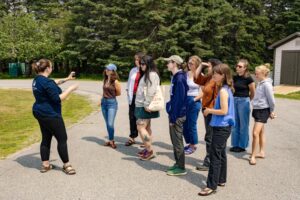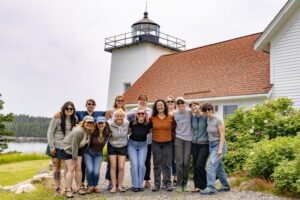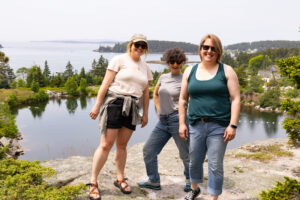Three times each year, the full cohort of 10 Island Institute fellows meet in person for retreats. At the start of the fellowship year in September, the fellows meet for orientation and then gather two more times on retreat. Our winter retreat this year was held on Vinalhaven where Kaylin Wu is living and working for her fellowship. Winter, with its natural tendency for us to go inward, is a great time to do a deep dive on a single topic and had the fellows and support staff discussing two sections of “All We Can Save”, a collection of essays from mostly BIPOC women on climate & community. Coming off the January storms, the fellows embraced hearing one another’s reflections, contemplations, and visioning a future if we “get it right”. Around the room, voices were heard equally and respectfully with comfortable silence at times their reflections from “All We Can Save” being used as a shared launching off point for discussion on how to talk with community members, colleagues, friends, and family about climate change and climate solutions.
When possible, retreats are held in locations where fellows are living and working. We were able to visit another fellow, Olivia Jolley, in her community of Swan’s Island for the summer retreat in late June. Catching the 9 am boat out of Bass Harbor, I will admit to being a little nervous about all the fellows arriving at 8:30 to park and board. Perhaps it was the early summer sunrise, and everyone was prompt and ready for the gorgeous ferry ride to Swan’s Island.
I do have to recognize that the Island Institute 2023-2024 fellowship cohort is something exceptional – this group of early-career professionals not only support and resource one another, they are friends. When the group comes together for retreats, it is filled with laughter, support, wisdom, and deep listening. — Lisa Millette
2024 marks 25 years of Island Institute’s fellowship program. In August, we will host a celebration of this milestone and over the past year, Island Institute’s multi-media storyteller, Jack Sullivan has been collecting stories from past fellowship participants. Usually, summer retreats focus on a professional development topic and getting to know the community where a fellow is immersed. This retreat was a little different in that it asked the cohort to turn outward as Jack came along and captured stories and viewpoints of fellows amid their fellowship.
Fellows are hired for their willingness to engage in community conversation and focus their time and skill on a community priority. Asking the cohort of fellows to be shadowed by a videographer is not in their job description, and yet they took it in stride as Olivia gave us a tour around the place she has lived for almost two years and plans to stay. We visited the school, the historic lighthouse, and I’m told Olivia provided colorful commentary to those in her vehicle as we drove around. After a lunch prepared by two of the fellows, a more formal interview took place in Olivia’s backyard. In front of a camera, fellows responded to questions such as “What are the challenges that you’re seeing in your fellowship that will be critical for the future of the coast of Maine?” and “What’s the most valuable thing to you about being an Island Institute fellow?”
Despite fellows having specific project focus areas: technology integration in schools, home energy transitions, community resilience or comprehensive planning, etc. this group gets the bigger picture. Like many of the writers in “All We Can Save”, the fellows understand the intersectionality of community development work. The fellow revitalizing an island’s historical society leads with an awareness that understanding a community’s history influences how their town makes decisions about the present and future. The fellow helping their community write a resilience plan clearly heard that the plan needed to address housing and community resources in tandem with sea level rise and energy transitions. Their interview for the 25th celebration saw the fellows speaking elegantly and articulately to these themes and others, such as their enjoyment and appreciation of the cohort model.
That’s not to say we get everything right about our fellowship program including the three retreats each year. We heard the fellows talk about the lack of diversity in Maine and trepidation to move to a state where not many people looked like them. Fellows also shared that while they have support of their cohort, the fellowship experience is often quite different than choices others in their friend group are making and that doing two years of deep community development work can slow down their ability to build up personal savings or pay back student loans.
I do have to recognize that the Island Institute 2023-2024 fellowship cohort is something exceptional – this group of early-career professionals not only support and resource one another, they are friends. When the group comes together for retreats, it is filled with laughter, support, wisdom, and deep listening. I feel lucky that part of my job is to facilitate spaces for them to gather and I sincerely wish that they continue to be each other’s sounding boards and peer coaches in the near and distant future.

